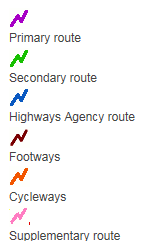Gritting and salt bins
On this page...
Gritting
Up to date gritting information
Keep up to date with our gritting runs via Twitter by following us @LutonCouncil on Twitter.Every time our gritting team goes out we make around 300 miles of road safer. We grit specific routes and footways in accordance with our Winter Maintenance Policy document during bad weather, as well as maintaining salt bins situated in key locations.
Some of the paths that are treated include
- Town centre streets/main pedestrian routes
- Shopping frontages
- Busy pedestrian routes
- Hospitals and doctors’ surgery frontages
- School frontages/routes
- Community centre frontages
- Steep sections of footway/footpaths
What are the gritting routes?
Gritting map key

Text version of gritting map key:
- Purple = primary route
- Green = secondary route
- Blue = Highways Agency route
- Red = footways
- Orange - cycleways
- Pink = supplementary route
Salting
There are over 240 grit bins across Luton provided for anyone to use on public roads and pavements not normally treated by a gritting vehicle. These are typically hilly, exposed locations and potentially dangerous road junctions. Find a salt bin near you.
Each bin is checked annually and refilled before the start of the winter season. These bins will then be checked and replenished as and when required throughout the winter period. Bins that are either broken or worn are replaced as necessary.
How can I request a bin, refill or report a damaged bin?
If you think your area needs a salt bin or are aware of an empty or damaged bin, let us know by using our salt bin request form.
If the bin has been vandalised or become a nuisance, it can be removed over the summer. Let us know by using the salt bin request form.
Make a salt bin requestLuton gets its salt from Winsford Rock Salt Mine in Cheshire. It lies almost 200m under the Cheshire countryside, and extends beneath the Irish Sea.
Rock salt is used for Luton’s Highway Network. The salt is applied dry, it won’t have any affect against snow and ice until it dissolves forming brine.
Salt becomes less effective at temperatures below minus five degrees centigrade (-5°C) and has almost no effect on temperatures below (-10), at these temperatures grit can be used, either alone or with salt to increase traction on icy surfaces.
So never assume that a road is in an ideal condition just because it has been gritted, if you have to drive, drive with extra care, be prepared and plan your journey times in accordance with the conditions.
The salt is intended for use on the highway. Salt stocks would run out quickly if everyone used them to treat their properties, so it is important that they are only used on public roads.
No, the salt we purchase is for use by us on the highway only.
Builders’ merchants and DIY stores may have some in stock. A good alternative is dishwasher salt.
A handful of salt, spread evenly, is enough to treat a square metre of footway to prevent icing. Snow should be cleared before treatment.
Snow
When around two or more centimetres of snow builds up on carriageways the decision may be made to fit snowploughs to the gritting machines.
Not all routes will be ploughed due to width restrictions or the presence of traffic calming measures. We have four predetermined routes for snowploughs based around major roads and emergency vehicle routes.
In prolonged snowy conditions manpower will also be directed to problem areas for snow to be cleared by hand, often as a result of calls from the public.